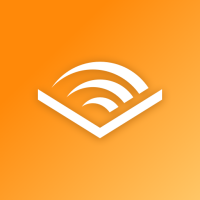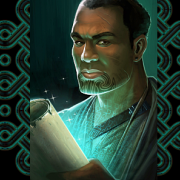Brandon works with Audible for a historic deal in the audiobook industry

Two years ago, when Brandon first announced the secret projects, people were surprised to hear the audiobooks wouldn't be available on Audible. Brandon had spoken out before about how he was worried about their business practices and what that would mean for authors with a lot less success than him, and for the secret projects––where the rights would initially be in his hands rather than going through Tor first, as Dragonsteel would be publishing the books themselves––he took a big risk, knowing most of his readership was through audio, and decided to promote other alternatives for audiobooks besides the Amazon-owned company. Now, after many conversations with the company, he's reached a historic deal, not aimed at himself, but to benefit indie authors in particular, who are the most affected by Audible's policies regarding royalties and exclusivity.
Many people have heard about this basic context. You remember Brandon explaining the new other options that weren't Audible. But today, I want to do more than just paraphrase this newest blogpost. So I want to explain the entire context behind the relationship between Amazon, and by extension Audible, and the publishing industry. I'm going to give a big shoutout to the Print Run podcast for a lot of this extra information that isn't pulled from Brandon's blog. If you're interested in the industry, go listen to them!
Part 1: Amazon's Origins
For those of you who don't know, Amazon started its online retail empire through books. The reason wasn't because of some artistic sensibility, but because books are "easy to ship and hard to break." In particular because with the amount of books and editions of each of those that exist, it is impossible to find them all at a physical bookstore. But it is possible with the internet. Which was the perfect opportunity for the business. The other thing about books is that they say something about us. The kinds of books you buy tells you a lot about a person, which for a business like this, is consumer data. Which helped them expand beyond the book realm.
Part 2: The ebook revolution
In these early days, Amazon started innovating a lot on distribution. The traditional process is pretty messed up, and Amazon made this a lot easier both for print books, but most importantly for ebooks. The Kindle changed the game. Dan likes to cite a statistic about how in sometime like 2012, the sales of books if I'm not mistaken, in that year alone, were higher than in the rest of history. And Amazon decided to price ebooks at 9.99 USD, and everyone agreed to it. But publishers eventually realized that their books couldn't cost that little. So they suggested switching to a model where they chose whatever price they thought was appropriate, and give Amazon a cut of that.
Part 3: The lawsuits
In 2010, we get the first large lawsuit with one of the Big 6 at the time, Macmillan. You all probably know that Tor is Brandon's publisher, but Tor is just an imprint of Macmillan. And Brandon has mentioned this incident before.
To put leverage on Amazon, Macmillan said they'd window their ebooks. One thing you should know about the publishing industry is that most sales for a book come in the first few months of it being out, or even before. The bestseller list is built on preorders and hype, because you can rack up those numbers with months of marketing and word of mouth which will all count for week 1, rather than doing all that work in a single week. What Macmillan was going to do was not release the ebooks until about 6 months later, where a good chunk of those people would have already read the book in hardcover, which costs significantly more.
But Amazon wasn't threatened by this. They pulled the buy buttons on Macmillan books, which means you literally couldn't buy anything from any of Macmillan's imprints on Amazon. I am not kidding, this is literally the nuke of book sales. So Macmillan panicked. Eventually, Amazon got enough backlash from the general public that they put it back, but they'd successfully scared the publishers.
So in 2012, the Big 6 at the time––HarperCollins, Penguin, Simon & Schuster, Macmillan, Hachette and Random House––came together to try to put pressure on Amazon to adopt the model Macmillan had suggested in 2010. Amazon filed a collusion suit against them, which prompted the Big 6 to settle. The compromise was that Amazon could discount books as much as they wanted, but they wouldn't get back their 9.99 ceiling. However, since Amazon has so much business elsewhere, this allowed them to use books as loss leaders.
7% of Amazon's sales were books in 2016, but 43% of all online retail went through them. Books were extremely insignificant for them, unlike the situation publishers were in. And of course, this accustoms people to go to Amazon first when they want to buy a book because they're more convenient and cheaper.
During this time, Amazon also started using this rhetoric of publishers as elitist and gatekeeping, that didn't want the good of the customers and authors, who if they self published on Kindle Direct Publishing would receive a higher royalty rate, particularly on ebooks, even if their books wouldn't be in physical stores as often, because physical stores don't like stocking Amazon published books.
In 2014, we get a second lawsuit, this time with Hachette. At the time, this was the biggest of the Big 6, with authors that are both incredibly prolific and popular, such as James Patterson. Who, I am not kidding, had books coming out about every week.
Hachette wanted better pricing now that their contract was up and it was time for renegotiation, but Amazon wouldn't budge, and Hachette wouldn't either. Even being the fourth largest trade publisher in the world, it was 12 times smaller than Amazon at the time. Just like last time, Amazon pulled the buy buttons, but they went further than that. They delayed shipping, pulled the preorder buttons, ceased their discounts, letting consumers feel the weight of the full price they weren't accustomed to, and filled Hachette recommendation pages with similar, cheaper books.
This caused a huge culture war. Amazon brought back their gatekeeper argument, saying the reason paperbacks took about a year to come out is because publishers wanted to get you with the bigger hardcover purchase, and that if Hachette gave all their online retail share and gave it to authors, they would stand down. Of course, Hachette couldn’t do this. In a way, Amazon lost this fight, but this is when everyone started getting involved. Particularly authors and agents.
One of the most famous agents to get involved was Andrew Wiley. He is probably the most well known literary agent, the one people will think of when they think of the classic agent. He is also very notorious for being extremely anti-publisher, saying that "if a book has sold out its advance, he failed as an agent because he didn’t get enough money for his authors." One would think he’d jump on the Amazon bandwagon of criticizing the publishers. But he didn’t. He spoke out on behalf of them. He went pro-publisher. This is because Amazon’s model dries up the money authors would be getting very fast. Publishers have less money to spend on advances or new deals, and become even more risk-averse, which is bad for authors. The fact that someone so notoriously anti-publisher would side with them against Amazon says a lot in my opinion.
Part 4: The Penguin Random House merger.
This brings us to the Penguin and Random House merger in 2013. Companies didn’t want to wait to have to fight the same fight Macmillan and Hachette had to deal with, and since they’d gotten caught colluding before, the solution was to make that collusion legal with a merger. This made Penguin Random House the biggest publisher in the world, and let me tell you it’s staggering how many imprints they own. You forget half of them until you start looking at their company timeline on their website.
What happens here is that because publishing’s response to Amazon is to band together, you get these two giants punching at each other with everyone else crushed in the middle because competition has been driven down, there are less places to submit a book to, less houses to drive up prices in auctions, and a lot of other side effects. You probably heard about the recent merger attempt between PRH and Simon & Schuster. Authors like Stephen King spoke out against that one because of these exact reasons, and Brandon’s Kickstarter that prompted this article also got caught in it because PRH and S&S were trying to use it as an example of how authors could go independent, making it even more necessary for a merger like this to keep business going. This original merger was just the first iteration of what happened in 2022 and early 2023.
In 2017, Amazon made a change to their buying page, where instead of automatically buying a new copy from Amazon’s warehouses, you could be buying from third party vendors who would usually be reselling. This means that you can’t trace that money back and that it won’t go to the authors. It also increased the chance of fake books or fraudulent copies.
Part 5: Audible in 2022
We’ve been talking about a lot of these policies in terms of ebooks, but they apply for audio too. In the old days, audiobooks were incredibly expensive, because they came in cassettes or CDs, and the process of getting them made was much more complicated. Just listen to any Wheel of Time fan who listened in audio from when the books first came out talk about it, or to Michael Kramer and Kate Reading in their many interviews. With Audible, Amazon made audiobooks viable again, and much cheaper, just like they did for ebooks.
In his 2022 State of the Sanderson post, Brandon explained why he wasn't putting the Secret Projects on Audible. He focused specifically on its impact on indie creators.
QuoteIf you want details, the current industry standard for a digital product is to pay the creator 70% on a sale. It’s what Steam pays your average creator for a game sale, it’s what Amazon pays on ebooks, it’s what Apple pays for apps downloaded. (And they’re getting heat for taking as much as they are. Rightly so.)
Audible pays 40%. Almost half. For a frame of reference, most brick-and-mortar stores take around 50% on a retail product. Audible pays indie authors less than a bookstore does, when a bookstore has storefronts, sales staff, and warehousing to deal with.
And worse, these are the rates for Amazon exclusive authors. That means they can't have their book available on any other platform, like Libro.fm for example, which is also very popular. The rates for non-exclusive authors drops to 25%. The other problem is that most audio companies turn around and put their books on Audible as well. Brandon cites Apple, Recorded Books, his own publisher Macmillan (who owns Tor), etc. And because of that, most of everyone else pays the same rates Audible does. To even try to compete with them. He urged readers to go to those other providers and try to change the tide.
Part 6: The new deal
On the 5th of March 2024, on the heels of another secret project announcement in conjunction with the Words of Radiance leatherbound, Brandon announced he'd had conversations with Audible about changing their practices. Like I hope you've been able to realize by now, getting Amazon to budge on anything is HUGE. Even authors with more clout than Brandon gave up pretty quickly. With that in mind, this is what Brandon says constitutes the new deal.
- Higher royalty rates for both exclusive and non exclusive authors
- The system will pay more predictably on credit spent, paid monthly rather than quarterly.
- They will provide a spreadsheet explaining how the money received will be split.
Brandon does clarify this is far from perfect. The percentage gap between exclusive and non exclusive authors is still about the same. This change doesn't bring royalties up to the 70% he wanted in the first place yet, authors still won't have control over pricing, and they will always sell for the price of a credit, which won't be raised with inflation.
He talks about how his agent, Joshua, spent months arguing for a 2% increase when Brandon was a new publisher to illustrate how important a small increase can be, even if this is bigger than 2%. And I hope this article has illustrated that as well. How difficult even getting them to move this much has been. Brandon explains that the Secret Projects will now be on Audible, and closes, thanking everyone for their support and the pressure they put on these issues.
Part 7: Reflecting about how all this affects the publishing industry
The publishing industry has always had this dilemma of art vs. business and where to fall on that scale. Treat it too much like a pure art and you get mentalities like the starving writer who does it despite not being able to sustain themselves. Treat it too much like a business and you lose out on the artistic value of works that won't sell as much in the moment. Works that sometimes become classics or will be praised critically but not be incredibly popular. My personal favorite example is Book of the New Sun by Gene Wolfe. It's not accessible to a lot of people because of the layers and the prose, and how much mental energy it takes. But it is an absolute masterpiece, and I don't know if in today's market it would be published because of those commercial considerations.
Sad as it is to say, the publishers left the door open for Amazon to fill the space because they failed to think for more than a second about the initial pricing of ebooks. And the way it's going, it only leads to more and more of a blockbuster model with publishers being risk-averse to new things because they are getting squeezed, it just makes the market harder for debut authors with new ideas and innovations, with more diverse voices. This year's Lee and Low Diversity Survey found that publishing is still 72% white, 71% cis women, 68% heterosexual, 83% able-bodied, and 58% living in the northeastern United States. And none of these numbers will change, like they barely did from the last time this survey was conducted, if we don't make an active effort to change them. That's why it is so important that Brandon stands up for these small authors, particularly those who publish independently. Traditional publishing isn't without its problems, but indie authors get affected the most by Amazon's policies that force them to be exclusive or take a huge loss to run ads as the only way to be discovered.
Amazon says it's good for consumers by having low prices, but in the long run it isn't good because it will be creating this white noise where nobody stands out and removing quality and variety from people's options because publishing becomes more risk-averse. Not only will those potential classics, or books that are very niche, or that are being revolutionary, ahead of their time, be lost, but the quality on more commercial books will go down. We're already seeing this with controversies like the Iron Flame printing controversy.
I hope that all these reflections about how it can affect our culture from multiple people will make an impact, and we'll start to see change. But we can't stay and do nothing. Even if you're not personally involved in the industry, there are still ways to affect it. Stay informed, use your local library and buy books in indie stores, preorder books, read more diversely, talk about the issues online, support indie authors. The list goes on and on. There is hope with a deal like the one Brandon has made. But we have to keep working for a better place, and better conditions for the artists we admire so much so they can keep bringing us amazing art.
Part 8: Conclusion
This article was originally just meant to go over the generalities of this deal and add information from the stream. But when I got my hands on it after a couple of days of discussion, I realized that it was a chance to talk about something I care about very deeply as a literature student and aspiring author, which lots of people may not know about. One thing I appreciate about the original stand Brandon took is that it showed people how bad the situation is, in a way that they wouldn't have even been aware of before. I hope that this article was a chance for you all to learn more about this beyond the endless paraphrasing of the same original article. And as pessimistic as I feel this sounded for a lot of it, what we need to take out of this is to make it known. Keep putting pressure on Audible to be better. Congratulate them for moving forward, but don't just let it rest here.
Feel free to ask any questions and to start more of a discussion in the comments, I would love to know what you think.




Recommended Comments
Join the conversation
You can post now and register later. If you have an account, sign in now to post with your account.